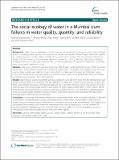| dc.contributor.author | Subbaraman, Ramnath | |
| dc.contributor.author | Shitole, Shrutika | |
| dc.contributor.author | Shitole, Tejal | |
| dc.contributor.author | Sawant, Kiran | |
| dc.contributor.author | O’Brien, Jennifer | |
| dc.contributor.author | Bloom, David E. | |
| dc.contributor.author | Patil-Deshmukh, Anita | |
| dc.date.accessioned | 2013-05-09T17:48:26Z | |
| dc.date.issued | 2013 | |
| dc.identifier.citation | Subbaraman, Ramnath, Shrutika Shitole, Tejal Shitole, Kiran Sawant, Jennifer O’Brien, David E Bloom, and Anita Patil-Deshmukh. 2013. The social ecology of water in a Mumbai slum: failures in water quality, quantity, and reliability. BMC Public Health 13: 173. | en_US |
| dc.identifier.issn | 1471-2458 | en_US |
| dc.identifier.uri | http://nrs.harvard.edu/urn-3:HUL.InstRepos:10613642 | |
| dc.description.abstract | Background: Urban slums in developing countries that are not recognized by the government often lack legal access to municipal water supplies. This results in the creation of insecure “informal” water distribution systems (i.e., community-run or private systems outside of the government’s purview) that may increase water-borne disease risk. We evaluate an informal water distribution system in a slum in Mumbai, India using commonly accepted health and social equity indicators. We also identify predictors of bacterial contamination of drinking water using logistic regression analysis. Methods: Data were collected through two studies: the 2008 Baseline Needs Assessment survey of 959 households and the 2011 Seasonal Water Assessment, in which 229 samples were collected for water quality testing over three seasons. Water samples were collected in each season from the following points along the distribution system: motors that directly tap the municipal supply (i.e., “point-of-source” water), hoses going to slum lanes, and storage and drinking water containers from 21 households. Results: Depending on season, households spend an average of 52 to 206 times more than the standard municipal charge of Indian rupees 2.25 (US dollars 0.04) per 1000 liters for water, and, in some seasons, 95% use less than the WHO-recommended minimum of 50 liters per capita per day. During the monsoon season, 50% of point-of-source water samples were contaminated. Despite a lack of point-of-source water contamination in other seasons, stored drinking water was contaminated in all seasons, with rates as high as 43% for E. coli and 76% for coliform bacteria. In the multivariate logistic regression analysis, monsoon and summer seasons were associated with significantly increased odds of drinking water contamination. Conclusions: Our findings reveal severe deficiencies in water-related health and social equity indicators. All bacterial contamination of drinking water occurred due to post-source contamination during storage in the household, except during the monsoon season, when there was some point-of-source water contamination. This suggests that safe storage and household water treatment interventions may improve water quality in slums. Problems of exorbitant expense, inadequate quantity, and poor point-of-source quality can only be remedied by providing unrecognized slums with equitable access to municipal water supplies. | en_US |
| dc.language.iso | en_US | en_US |
| dc.publisher | BioMed Central | en_US |
| dc.relation.isversionof | doi:10.1186/1471-2458-13-173 | en_US |
| dc.relation.hasversion | http://www.ncbi.nlm.nih.gov/pmc/articles/PMC3599692/pdf/ | en_US |
| dash.license | LAA | |
| dc.subject | Diarrhea | en_US |
| dc.subject | Water quality | en_US |
| dc.subject | Water quantity | en_US |
| dc.subject | Contamination | en_US |
| dc.subject | Coliform bacteria | en_US |
| dc.subject | Household water treatment | en_US |
| dc.subject | Safe storage | en_US |
| dc.subject | Urban slums | en_US |
| dc.subject | India | en_US |
| dc.title | The social ecology of water in a Mumbai slum: failures in water quality, quantity, and reliability | en_US |
| dc.type | Journal Article | en_US |
| dc.description.version | Version of Record | en_US |
| dc.relation.journal | BMC Public Health | en_US |
| dash.depositing.author | Bloom, David E. | |
| dc.date.available | 2013-05-09T17:48:26Z | |
| dc.identifier.doi | 10.1186/1471-2458-13-173 | * |
| dash.authorsordered | false | |
| dash.contributor.affiliated | Subbaraman, Ramnath | |
| dash.contributor.affiliated | Bloom, David | |


